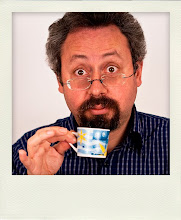Just finished to listen to "Tristan and Isolde", an opera I love but that always puzzles me. What puzzles me is, in a sense, how we can survive it. I mean, it's such an powerful condemnation of morality, convention and even society itself, such a radical celebration of passion and desire at its most intense, uncompromising, self-destructive intensity... we love it for that reason, we listen to it fascinated and enthralled and then we go back to our restrained, rational, bland lives, to the same conventions, morals and society that the opera denounces so powerfully. Isn't art, even the greatest art, a failure? Isn't it completely impotent to change our lives?
The same type of question (and maybe a hint to an answer) can be posed in my opinion by the comedy of Jerry Sadowitz and Doug Stanhope.
Let's start with Sadowitz. Watching him live (and you can only watch him live) is one of the strongest experiences you are going to live as a spectator of any art. It's like if somebody took one of your internal organs, let's say your liver or your spleen, and put it on a table for you to observe. You would probably feel a certain repulsion and disgust, but you would also have to recognise that it's a part of you after all, even if a part you normally prefer to forget. Sadowitz's jokes, in fact, are always extremely unpleasant, they seem to draw from a level of our being that it's too deep and too ancient for morality and civilisation itself. It's a level at which we are misantropic, misogenic and racist not because we believe that's right (there is no belief and no right or wrong at that level) but because we just feel threatened by everybody and everybody is an enemy. Sadowitz behaves and looks like a man completely dominated by his Id, in a sense he is a monster, but a monster that is also us. We laugh at his jokes because we feel reconnected to a level of ourselves that is normally forgotten and repressed, a level that is actually what we built our civilasation against. Civilsation, we know from Freud, has its owns discontents and Sadowitz allows us to take a little vacation from them. Which doesn't mean, of course, that we leave his shows less civilised, more misanthropic, misogenic and racists than we were before. After a vacation normally we stil go back to work. But this does not mean that vacations are pointless either.
Something similar happens while you watch a show from Doug Stanhope. If Sadowitz forces you to face your Id, Stanhope forces you to push your intelligence to its extreme, iper-rational and sometimes paradoxical consequences. To admit, for instance, that abortion is the best solution to global warming. After leaving his shows you will probably still compliment your friends for their new babies, but again you will have enjoyed a vacation from the limits that decency and morality always pose to the free exercise of our rational thinking.
So my conclusion is that Wagner, Sadowitz and Stanhope will never change our lives but, by offering respite from its constant restraints and limitations, will at least make it more bearable.

